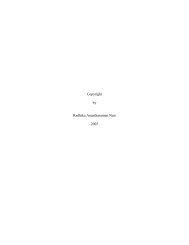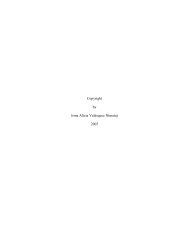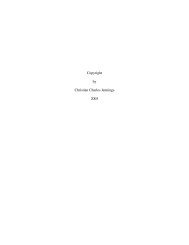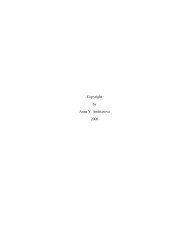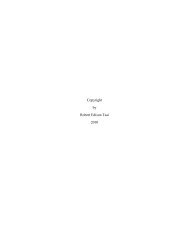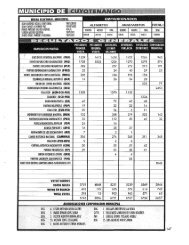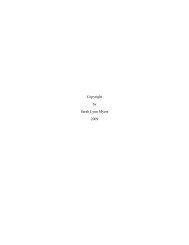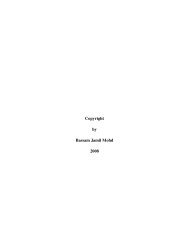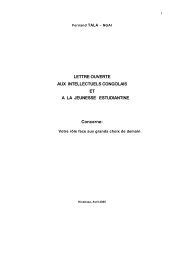- Page 1 and 2:
CopyrightbySusanne Elizabeth Shawye
- Page 3 and 4:
Radical Street Theatre and the Yipp
- Page 5 and 6:
Kokai, Olivia Whitmer O’Hare, Tam
- Page 7 and 8:
organizational strategies of the an
- Page 9 and 10:
IntroductionThe Chicago Poster:Cont
- Page 12:
adical hipsters, or counterculture
- Page 20:
linguistic theory, the field of per
- Page 23 and 24:
The language of performance thus al
- Page 25 and 26:
protest from theatre. 8 Mass demons
- Page 27 and 28:
performative has the potential to e
- Page 29 and 30:
evolution using methodological and
- Page 31 and 32: Realist, suddenly noticed that when
- Page 33 and 34: Revolution for the Hell of It is a
- Page 35 and 36: The Yippies’ politics are clear i
- Page 37 and 38: 2). They embraced a romantic notion
- Page 39 and 40: made up of many separate organizati
- Page 41 and 42: and a free store on the Lower East
- Page 43 and 44: When they formed the Youth Internat
- Page 45 and 46: Most of the dozen core Yippies were
- Page 47 and 48: acknowledgment that her business sk
- Page 49 and 50: The claim of millions of Yippies wa
- Page 51 and 52: Man to tease out the New Left’s n
- Page 53 and 54: eports from the popular press, test
- Page 55 and 56: Image of Yippie Chicago poster.47
- Page 57 and 58: surround the Pentagon are a long wa
- Page 59 and 60: the Conference for New Politics in
- Page 61 and 62: Washington was no stranger to mass
- Page 63 and 64: uilding in acts of civil disobedien
- Page 65 and 66: had a history of civil disobedience
- Page 67 and 68: the crowd into affinity groups by m
- Page 69 and 70: Like Abbie Hoffman, Rubin was aware
- Page 71 and 72: Krishna” and “Om” to their re
- Page 73 and 74: Pentagon began its work for the wee
- Page 75 and 76: A respectable horde of respectable
- Page 77 and 78: that time was still expected to see
- Page 79 and 80: It didn’t matter if there was dis
- Page 81: democratic political-economic and c
- Page 85 and 86: The aesthetic of the New Left now t
- Page 87 and 88: straight-laced emphasis on communit
- Page 89 and 90: Unlike the young student politician
- Page 91 and 92: on the improvised actions of variou
- Page 93 and 94: society” by changing, not ignorin
- Page 95 and 96: similar to the very same ones used
- Page 97 and 98: scenery falls. The Yippies loved th
- Page 99 and 100: unrest by the lower ranks of societ
- Page 101 and 102: Don’t rely on words. Words are th
- Page 103 and 104: writing to President Johnson from V
- Page 105 and 106: wasn’t just their situation that
- Page 107 and 108: freshly-shorn young men in army uni
- Page 109 and 110: I also argue that blurring of life
- Page 111 and 112: Armed with a budget of just $15.00
- Page 113 and 114: ounced through the air above the cr
- Page 115 and 116: they ran into again in Chicago when
- Page 117 and 118: Yip-In moved into an unexpected sec
- Page 119 and 120: Yippies had been publishing manifes
- Page 121 and 122: experimental works. Like other New
- Page 123 and 124: not Broadway, was the venue for pla
- Page 125 and 126: adicalism of Off-Off-Broadway conte
- Page 127 and 128: theater, and including it on their
- Page 129 and 130: environment that pays special atten
- Page 131 and 132: meaning or appreciate the aesthetic
- Page 133 and 134:
Since Happenings emerged from New Y
- Page 135 and 136:
that contrasted visual peaceful pro
- Page 137 and 138:
prominence of ordinary actions and
- Page 139 and 140:
The costumes of the Yip-In particip
- Page 141 and 142:
ecruit, several blocks from the hip
- Page 143 and 144:
free stores, or crash pads. In 1969
- Page 145 and 146:
The hippies and Yippies also used m
- Page 147 and 148:
from their weekday Establishment re
- Page 149 and 150:
perform the power of authority and
- Page 151 and 152:
commuters the actions and dress tha
- Page 153 and 154:
emotion and hope, like the “utopi
- Page 155 and 156:
Chapter ThreeThe Festival of Life:
- Page 157 and 158:
Double (1938). The Yippies used the
- Page 159 and 160:
anti-war views, and movement leader
- Page 161 and 162:
Republican candidate Richard Nixon;
- Page 163 and 164:
death, it seemed like Humphrey was
- Page 165 and 166:
American politicians. We’ll infil
- Page 167 and 168:
named themselves the Youth Internat
- Page 169 and 170:
if necessary, Mobe was unable to ge
- Page 171 and 172:
ut the Yippies’ signs supported a
- Page 173 and 174:
craze, offering a special section o
- Page 175 and 176:
efforts to bring performances to th
- Page 177 and 178:
commentary in the East Village Othe
- Page 179 and 180:
which Hoffman designated as ‘medi
- Page 181 and 182:
already in Chicago, and prepared to
- Page 183 and 184:
Even though many of the demonstrato
- Page 185 and 186:
with a fire-cracker throwing crowd
- Page 187 and 188:
Hilton to interview passing delegat
- Page 189 and 190:
political positions, merged to form
- Page 191 and 192:
protest against the order, rules, a
- Page 193 and 194:
experience the performance event wi
- Page 195 and 196:
The Battle of Michigan Avenue was a
- Page 197 and 198:
“It would take an inspired Artaud
- Page 199 and 200:
The letters in the Johnson Library
- Page 201 and 202:
watching” (Box 66). Korean War ve
- Page 203 and 204:
members who felt that the Yippies g
- Page 205 and 206:
Dismayed by his lack of action abou
- Page 207 and 208:
night of the Battle of Michigan Ave
- Page 209 and 210:
Chapter FourFlash Mobs: The Yippie
- Page 211 and 212:
that is, they were political only t
- Page 213 and 214:
as their primary political and cult
- Page 215 and 216:
1969, “Four Days of Rage” campa
- Page 217 and 218:
The Festival of Life and the ensuin
- Page 219 and 220:
The Yippies’ revolutionary action
- Page 221 and 222:
Glasgow, Rome, Vienna, Berlin, Sydn
- Page 223 and 224:
and social conventions: flash mobs
- Page 225 and 226:
social behaviors, and the technolog
- Page 227 and 228:
organized by anyone with access to
- Page 229 and 230:
advantage of the dramaturgy of prot
- Page 231 and 232:
Yet the insider/outsider dynamic of
- Page 233 and 234:
List of AbbreviationsCOREFBIHUACLBJ
- Page 235 and 236:
Letter, Roger Light to the Presiden
- Page 237 and 238:
Telegram, Marjorie Satthoff to the
- Page 239 and 240:
Brown, Joe David, ed. The Hippies.
- Page 241 and 242:
Editorial. Chicago Tribune. 29 Aug.
- Page 243 and 244:
Higgins, Dick. “The Origin of the
- Page 245 and 246:
Karastamatis, John. “Don’t Star
- Page 247 and 248:
McMillian, John. “Garbage Guerril
- Page 249 and 250:
Rosenberg, Bernard. “Chicago: Blo
- Page 251 and 252:
Stewart, M. J. F. and Davis, Lisa.
- Page 253:
VITASusanne Elizabeth Shawyer was b



